Movie review: 'My Father's Dragon' (2022)
 My Father's Dragon is a 2D animated children's fantasy film, the latest from Cartoon Saloon, directed by Nora Twomey. The studio kept an amazingly tight lid on this 99-minute production, with its trailer only becoming available five weeks before the film was released on Netflix. I'm very glad this project didn't get cancelled, what with partially being made during the Covid pandemic.
My Father's Dragon is a 2D animated children's fantasy film, the latest from Cartoon Saloon, directed by Nora Twomey. The studio kept an amazingly tight lid on this 99-minute production, with its trailer only becoming available five weeks before the film was released on Netflix. I'm very glad this project didn't get cancelled, what with partially being made during the Covid pandemic.
The main character is a quick-thinking boy named Elmer. After he shows kindness to Whoopi Goldberg-- I mean, to a talking cat, the magical neko tells him there's an island where he can find a dragon. And if Elmer can bring the dragon back, its novelty will save him and his single mom from financial ruin! So off Elmer goes, equipped only with a bunch of random stuff he happens to have in his bag. The situation on the island is difficult, and Elmer isn't the only one who needs the dragon.
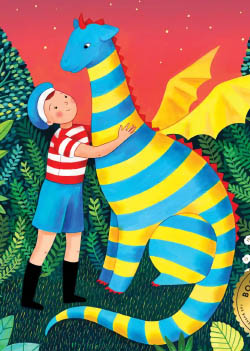 How furry is it? Sssort of. Only in the sense of having animals that can talk; none of them are physically anthropomorphic, aside from a few primate species. A diplomatic gorilla is the closest this film gets to having an antagonist. As for the dragon, he has a very... unique design, because he's based on illustrations from a 1948 children's book that inspired this film. Despite getting top billing, the dragon is not especially interesting.
How furry is it? Sssort of. Only in the sense of having animals that can talk; none of them are physically anthropomorphic, aside from a few primate species. A diplomatic gorilla is the closest this film gets to having an antagonist. As for the dragon, he has a very... unique design, because he's based on illustrations from a 1948 children's book that inspired this film. Despite getting top billing, the dragon is not especially interesting.
What this film does well is provide a sense of adventure and danger. Drawn in Cartoon Saloon's signature geometric artstyle with excellent use of color, it continues the common theme of their other films, a child protagonist trying to persevere against a situation that looms over them. Story-wise, it's a little uneven. It's primarily for younger children.
I wouldn't call it a must-see, unless you're a fan of Cartoon Saloon's work; personally I would much more highly recommend Wolfwalkers (exclusively on Apple TV+). My Father's Dragon scores 87% with critics and 77% from audiences on Rotten Tomatoes. I'm with the audience, although I'd give it a 68% "Enh, maybe". Check it out if you're interested though!
As for being a book adaptation... That's something to rant about. Major spoilers ahead.
A shift in story
First off, it's difficult to make comparisons without knowing the source material, which can be read for free on Project Gutenberg; it's about 8,000 words long. The story's structure is very simple, and if the film had stuck to it, it would have only appealed to a very narrow age range.
Probably for financial reasons, Cartoon Saloon wanted the film to appeal to families, so a lot had to be added and changed. Even so, adult viewers are probably not going to get much out of it. At least the studio didn't have as much of a challenge as Spike Jonze did, with "adapting" Where the Wild Things Are. Going from a book that only has 338 words, to having a feature-length story... it became its own, different thing.
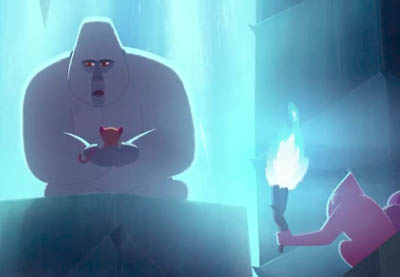 So too is the case with My Father's Dragon. There's a kind of committee-like feel to it. "The dragon is only a MacGuffin at the end of the book? That's no good. People will be expecting a dragon. He needs to show up at the start of the adventure. What's his deal, anyway? Baby dragon, fell off a cloud, hurt his wing, lazy animals on the island heal him, but keep him as a slave to run a ferry service? And beat him?! No no no, we can't do that."
So too is the case with My Father's Dragon. There's a kind of committee-like feel to it. "The dragon is only a MacGuffin at the end of the book? That's no good. People will be expecting a dragon. He needs to show up at the start of the adventure. What's his deal, anyway? Baby dragon, fell off a cloud, hurt his wing, lazy animals on the island heal him, but keep him as a slave to run a ferry service? And beat him?! No no no, we can't do that."
"We need a better conflict. Uh. Ok. Kid wants the dragon, and the animals need the dragon. Forget the broken wing, his wings are fine. But he's gotta have a reason for being there. He's a... voluntary prisoner, he's trying to stop the island from sinking. Rite of passage or something. But it's not working. Ok. Kid comes in, clueless about the situation, rescues the dragon, his wing gets hurt, now everyone's in trouble. Let's run with that."
Mangled morales
The weirdest difference between the book and the movie is that a message has been shoe-horned in. And not a typical children's film message about self-confidence, pollution, or things like that. It's something like... parents try to have good intentions, but sometimes their reassurances manifest as manipulative short-term promises? Or maybe, sometimes you have to drop your ego and admit that your plan isn't working? I'm serious. The whole film is a lesson for Elmer to be able to relate better to his mother's problems and cut her some slack.
This is accomplished by Elmer being put in a parallel situation, having to babysit, reassure and manipulate the young dragon he's rescued. The gorilla leader on the island has been doing the same thing with the other animals during their crisis. His "son" (well, henchman), a macaque, experiences identical disillusionment, just as Elmer does with his own mother.
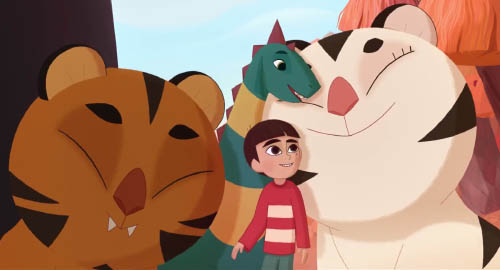 Elements from the book are scattered throughout the movie, but their function, tone and importance have been wildly altered; very few remain intact. In the book, Elmer is a Guile Hero. He tricks most of the dim-witted animals on the island, who would be glad to eat him, and each of the items he had the foresight (not random-ness) to pack in his bag turn out to be useful.
Elements from the book are scattered throughout the movie, but their function, tone and importance have been wildly altered; very few remain intact. In the book, Elmer is a Guile Hero. He tricks most of the dim-witted animals on the island, who would be glad to eat him, and each of the items he had the foresight (not random-ness) to pack in his bag turn out to be useful.
But in the film, well-intentioned guile is turned into a moral lesson, something to later regret. What I do find interesting in the film, however, is that it doesn't actually have an antagonist. The gorilla's actions turn out to be completely understandable, born of desperation. That's tricky to pull off, and they do it well! The voice acting is also very good. Except for the neurotic tarsier. Could have done without that.
Aside from the various plot tokens (including the dragon), the main thing in the film that remains true to the original book is the constant feeling of adventurous danger that Elmer experiences. In the book, the danger feels kind of exciting. In the movie, it feels oddly melancholy. In the book, Elmer wants to experience flying, hence the dragon quest. In the movie, he wants a way to make money.
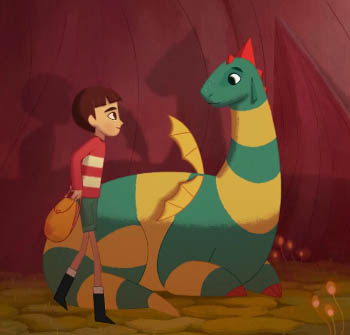
A dragon that drags
Let's talk about Boris, the dragon. Dragons are supposed to be cool and/or dangerous. They represent strength. Even if a dragon isn't huge or strong, in stories their strength will manifest in other abilities or personality traits. Boris is about the size of an elephant, and is definitely strong. But after Elmer rescues him, his wing is injured, so he can't fly (another important way dragons are supposed to be cool). And Boris is a child. He's afraid of fire. He's afraid of large bodies of water. He's got self-confidence issues. In short, there is nothing cool about Boris, and every single one of his issues is obviously there to impede the journey. The dragon is The Load.
To make Boris even more of a disappointment, he doesn't even get a character arc. Near the end, when the plot requires it, hey, his injured wing suddenly works again! And then, inexplicably, he looks at some fire, spontaneously gets over his fear of it, and saves the day. No explanation. Made more insulting by the fact that, prior to Elmer rescuing him, he had been sitting next to the same fire for probably several weeks, and no useful thoughts had occurred to him during that time.
Was it too much trouble to make Boris's new-found resolve actually meaningful, with character-building and context? That would have been a great message for kids, being able to see how he overcomes his own personal obstacles. And since the writers had already decided to add messages, why miss this opportunity?
A completely different story
But as a book adaptation, so much has been changed; it's no longer the-film-of-the-book. Returning to my earlier comment about how Elmer in the book is a Guile Hero - imagine taking a classic Bugs Bunny cartoon, or an episode of Detective Columbo. Now imagine re-writing them so it becomes a moral lesson about how tricking people is bad, despite good intentions. Would it feel like a good adaptation? No. The guile is the entire point of the original!
Or, if you argue that the book isn't really suited to be adapted into a film, that it was necessary to make huge changes so it would work, well... explain the respect for the original material in Elmer no bouken, the 1997 anime film.
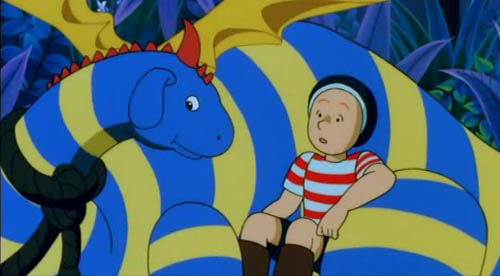
Overall, in my opinion, it's a bad book adaptation. But if you're judging the film on its own merits, it's largely fine. Not amazing, but decently entertaining for kids, and I'm always keen on Cartoon Saloon's visual style!
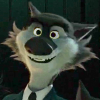
Comments
Um... hel-LO? Furry = Anthropomorphic character. Talking non-human = Anthropomorphic character. Therefore talking non-human = Furry. Must we go over this again?
The dragon is named Boris, not Bruno. (Both is the book and in the film.)
Clearly someone was watching too much Enchanto when they wrote it, I suppose.
These names have been updated: Though the "Let's talk about Boris" line for some reason feels weird now.
I won't talk about it.
Whoops, thanks for the correction! Just goes to show how much of an impression they left on me. :-D
Post new comment